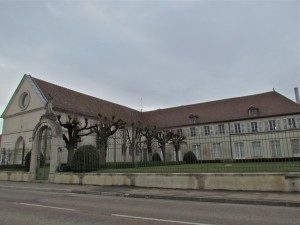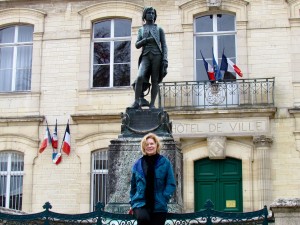In 1779, nine-year-old Napoleon arrived at military school in Brienne. Barely speaking French in a heavy Corsican accent, he faced five years of isolation, austerity and mockery. Yet, despite his ardent Corsican nationalism, it was here he became a Frenchman. He also became an impassioned reader of history, devouring Plutarch’s Lives and demanding access to what the limited library could offer. Of all his studies, he excelled most at mathematics, pointing him to a career in the artillery. Thus, the boy became the man.
Years later, as a triumphant general, he tried to buy the grand chateau he could see on the hill above his school yard. The family refused to sell, but today Brienne, a village about three hours from Paris, embraces all things Napoleon as it hopes to enlarge its tourist trade. Even the local drug store is named Pharmacie Napoléon.
 On display in the museum housed in the remains of his old school, Napoleon’s admission papers illustrate how the French of his day regarded Corsicans as foreigners. In a letter to Napoleon’s father, the school authorities ask for a French translation of Napoleon’s mother’s name. Charles Bonaparte responded, “There is no translation for “Maria-Letizia Ramolino.”
On display in the museum housed in the remains of his old school, Napoleon’s admission papers illustrate how the French of his day regarded Corsicans as foreigners. In a letter to Napoleon’s father, the school authorities ask for a French translation of Napoleon’s mother’s name. Charles Bonaparte responded, “There is no translation for “Maria-Letizia Ramolino.”


Pingback: Finding Napoleon » Napoleon’s Corsican Grotto
ME INTERESA MUCHO LA VIDA DE NAPOLEON BONAPARTE.
ADEMAS , MI BISABUELO, POLACO , ESTUDIÓ EN LA ESCUELA MILITAR DE BRIENNE Y
SEGÚN LA HISTORIA FAMILIAR , ERA PRIMO DE MARIA WALESKA -NO SÉ SI ESTA CORRECTAMENTE ESCRITO ESTE APELLIDO.
EL NOMBRE DE MI BISABUELO ERA NICOLAS MUNTAABSKI.
Gracias por sus comentarios muy interesantes. El apellido se escribe Maria Walewska. Esta mujer dio a luz a un hijo de Napoleón de una manera que están relacionados con Napoleón! Por favor, siga leyendo mi blog.
Pingback: Finding Napoleon » Bonaparte or Buonaparte?
Hello, You are wrong when you say about Napoleon become a Frenchman & BIRD PLACE CORSICAN, it’s wrong that : This father is Le comte of Marbeuf, Louis. Who more riche than the King of France. (it’s Louis Phillippe who cut the page of register of Saint-Seve in Britany “part of France”, manor of Penn ar Venn. There Napoleon is born there & his father return him at the age of two years in Corsica.(Napoleon dont liked the Corsica who he told “is betray people”, it’s one reason he refuse to fight with the Vendeans,” rist his head” he loved this Giant people about extermination “Génocide”. Leatizia is not a Corsica, she are origin of Genoa/Napolitan people.,she just born in Corsica. she have 4 childs with MARBEUF.
Napoleon made married with Joséphine with a wrong bird paper of brother Nabulion, made by charles Bonaparte, his brother is a importance priest, he do this wrong paper of bapteme 1771. (the story about Napoleon is wrong on many point) dont speak with any people. all liars,( because all dont know true story and dont want that you tiking are not cultivated)
you must read many book about this ! like the one Napoleon, son of Comte of Marbeuf, (fils du Comte de Marbeuf) IN FRENCH , difficult to found (2006) maybe on eBay.fr, so, sorry for my bad English.
Guitton de la verrie (Vendéans wars survived family of 1793 & more)
Thank you for writing. There are so many different opinions about Napoleon and I’m always interested in hearing them. I have read some that agree with you and if I get a chance I’ll search out the book you recommend.
All the best,
Margaret
Napoleon was not the son of Compte de Marbeuf avoiding to Broers.
Ernest Wahl
Hello, thanks for your comment. I agree, but there are so many rumors and propaganda about so many aspects of Napoleon and his family’s lives that it’s difficult to parse out the truth. For instance, I just picked up a recently-published novel about Napoleon’s second wife, Marie Louise, and was shocked to see that its premise included a completely fictional incestuous relationship between Napoleon and his sister Pauline. Even though it’s a novel, I’m sure that many people who read it will assume that’s the truth. It seems no scandal or crime is too small or too large to be attributed to Napoleon!
Napoleon Bonaparte (see: buona – parte, like good – part) comes from a family of Cargese (Ajaccio) in Corsica.
Furthermore, although it seems incredible, it is perhaps true, there are important sources from which it appears that Napoleon’s ancestors have family roots or relations with the imperial family of Komnenos (see: Byzantine Empire of Trebizond ~ 1461 AD, last emperor: David Komnenos).
A.S.P.
Sources:
1. Memoirs of Madame Junot (Duchesse D’Abrantès) – Napoleon I, Emperor of the French, 1769-1821, France — History Consulate and First Empire, 1799-1815,
https://archive.org/stream/memoirsofmadamej03abra#page/n9/mode/2up
2. Madame Junot – Duchess d’ Abrantes (bio): https://en.wikipedia.org/wiki/Laure_Junot,_Duchess_of_Abrantes
3. Cargèse, Corsica, https://en.wikipedia.org/wiki/Carg%C3%A8se
4. Napoleon Father: Carlo Buonaparte. https://en.wikipedia.org/wiki/Carlo_Buonaparte
5. Byzantine Empire of Trebizond, David Comnenos
https://en.wikipedia.org/wiki/David_of_Trebizond
https://en.wikipedia.org/wiki/Empire_of_Trebizond
Interesting! Thanks for the source references. You do have to be a bit careful trusting the writings of some of Napoleon’s contemporaries who often had a bone to pick with him or needed to demonstrate loyalty to the restored king. Vincent Cronin’s bio of Napoleon has a good listing of why some should be trusted and others not. So does the more recent Napoleon A Life by Andrew Roberts.
Thanks for your comment. Are you from the same lineage?
Margaret
Napoleon Bonaparte’s DNA has a much deeper and older history, than what is often mentioned. His very rare DNA reveals his very ancient ancestry – originating from N. African Berber bloodlines far older than 7000 years ago, predating populations that arrived long after the Berbers. Ancient settlements in the mountains across N. Africa, indicate that a pastoral culture with advanced knowledge of astronomy, and navigational skills that made them worldly traders by land and sea. The Indo-Aryan Berbers originated in C. Asia, and populated N. Africa while trading from the Atlantic to SE Asia along a trade route similar to the later Chinese Silk Road. The Berber polymaths and lateral thinkers developed mathematics, astronomy, navigation, commerce, and animal husbandry. The ancient trading routes and Silk Road were the “University” that brought knowledge and introduced many religions to the Arabs, C. Asians, and Asia.
With this background of unique DNA, advanced knowledge in mathematics and science, worldly experience in trading and commerce, Napoleon’s bloodline had a history of tremendously wealthy silk merchant families trading for centuries on the Silk Road, Venetian Palaces and elite membership in the 1000 “Golden families” of Venice and the Council of Ten, as well as dynasties of Kings and Emperors of the Roman Empire, and the Eastern Holy Roman Empire (Comnenus Dynasty).
Napoleon was more than prepared to be the Emperor of France. When he conquered countries in Europe he left them administerily and militarily reorganized and able to create wealth in their countries. When he learned that Leon, the silk capital of France, was in decline, he made treaties with the courts of Europe giving France the exclusive rights to provide silk to their courts, and made Leon the best silk center in Europe. As Napoleon conquered the world, he sometimes found friends instead of enemies that stopped many wars, and created opportunities and prosperity for countries he had defeated.
Two years ago I discovered that my family is related to the Bonapartes, and that we also lived on Corsica near them, as well as in Martigny Switzerland. When Napoleon was crossing the Alps (there is a very famous painting of him in that pass) with his Army in the dead of winter to attack Italy from the North, he stayed in Martigny, Valais, Switzerland, with my fathers family, the Morets. Martigny is the pass to the higher parts of Switzerland, and has always been strategically well garded to protect it from military invasions. Napoleon and his Army spent a week there with my family, planning the strategy and difficult crossing over the pass with heavy cannons, horses, and other heavy equipment. He won the war and moved on to attack Venice. When he and his army arrived in Venice to start the next war, the Venetians came joyfully to greet him with their antique Golden Book that listed the 1000 Golden Families in Venice. When they showed Napoleon his familys name and Palaces, he forgot the war and partied in Venice for several weeks before leaving to conquer Macedonia.
DNA does not lie. I look like Napoleon, am a polymath/lateral thinker like he was, and my youngest brother looks like the Comnenis Greek side of Napoleon’s family. No wonder, my father’s family are “Morets” – the European name for the Moors or Berbers who were taken to Europe by the Crusaders, to build an infrastructure of banking, hospitals, fire departments, and buildings because Europe had very little infrastructure then. Switzerland was the only country in Europe that gave assylum to the Knights Templars and Moors/Morets when the French King declared throughout Europe that they should all be burned at the stake, and they are still there.
That’s really interesting. After I read your comment, I saw that there is a lot of public information about the details of Napoleon’s DNA. I knew hair samples had been tested but I didn’t know so much detail was available. You’ve given me a new research project! And that’s the thing about Napoleon and the Bonapartes–you never run out of material to study and leads to follow to find more.
Lucky you to be related to the family! Thank you for the fascinating comment.
Margaret
Very cool!
Pingback: Bonaparte or Buonaparte? - Margaret Rodenberg
Pingback: A BOOK REVIEW: To Befriend an Emperor, Betsy Balcombe's Memoirs - Margaret Rodenberg
What a work ! What a personal investment ! I congratulate you and wish you every success.
Quel travail et quel investissement personnel ! Je vous félicite et vous souhaite un grand succés avec votre livre.